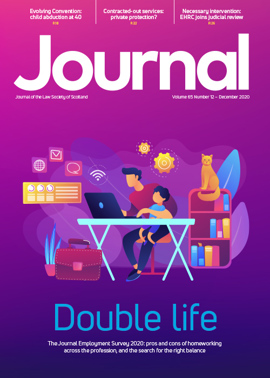Signed away? Privatisation and human rights

Private providers now play a significant role in the delivery of our public services. Generally, people have no choice in whether the particular service they need is provided directly by the public sector or by a private party under contract with a public body. What does this mean for the protection of our human rights? What can we do in Scotland to ensure that our human rights laws recognise and respond effectively to the reality of private sector involvement in public life?
This issue came into sharp focus in Scotland last year following the court’s decision in Ali v Serco Ltd [2019] CSIH 54. Now, with new laws being introduced in Scotland to incorporate a wider range of international human rights directly into domestic law, there is a need to ensure our human rights laws can operate effectively within a contracting-out culture.
Functions of a public nature
Section 6 of the Human Rights Act 1998 (“HRA”) provides that it is unlawful for a public authority to act in a way which is incompatible with a Convention right. The definition of “public authority” includes “any person certain of whose functions are functions of a public nature” (s 6(3)(b)). The HRA therefore applies not only to “core” public authorities, for example the NHS and the police, but also private parties when exercising functions of a public nature. This reflects the well established principle of human rights law that a state cannot contract out of its human rights obligations.
The HRA was drafted at a time when the private and voluntary sectors’ role in providing public services had been steadily increasing for decades. The parliamentary debates on the Human Rights Bill highlight the clear intention of Parliament to give a wide interpretation to s 6. The Government wanted the HRA to apply in what it saw as “a realistic and modern definition of the state so as to provide correspondingly wide protection against an abuse of human rights”. Although the precise scope was to be left to the courts to determine, Parliament was clear that the assessment should be based on the nature of the function being performed, and not the legal status or form of the body itself.
Why does it matter?
The House of Commons Public Administration & Constitutional Affairs Committee report After Carillion: Public sector outsourcing and contracting highlights that there are now private markets for public services that simply did not exist 30 or 40 years ago. The extent of private sector involvement in our public services has also been highlighted by the response to COVID-19, which has relied heavily on the private sector in a number of areas.
There are mixed views around appropriate levels of private sector involvement in the delivery of public services; however, the fact of their involvement is clear. Ensuring that, where appropriate, private providers are brought within the scope of the HRA seeks to avoid a two-tier system of rights protection. Levels of rights protection should not differ according to the legal status of a provider.
Any uncertainty over the application and scope of the HRA creates unintended and unequal outcomes for people. It also undermines the vision that human rights should be central to public service delivery. During the introduction of the HRA, the phrase “bringing rights home” did not only mean that people would now be able to rely directly on their Convention rights in domestic courts: it sought to create a wider human rights culture. It was hoped human rights would become a driver in the development of law and policy, and run central to the delivery of public services.
Those involved in the delivery of public services must be clear about their obligations, and accept those obligations. Similarly, in delegating responsibilities to private parties, “core” public authorities (for example central government) should be confident and explicit about where human rights responsibilities rest, before concluding agreements with third parties.
Interpreting s 6: a restrictive approach
In the absence of a statutory definition for the terms “public authority” or “functions of a public nature”, the courts have been charged with the task of interpreting the HRA to reflect a fair distinction between public and private functions. With some notable exceptions, the courts have tended to adopt a narrow and restrictive approach to interpretation. The leading case of YL v Birmingham City Council [2007] UKHL 27, in which the House of Lords found that a private care home was not exercising functions of a public nature, presented an opportunity to widen the scope of application. The decision, by a 3-2 majority, came under much criticism as a missed opportunity.
In general, the courts’ treatment of s 6(3)(b) reveals a tendency to consider the institutional character of a body, for example its status as a for-profit company, rather than the nature of the function being performed by that body. This is seemingly in direct conflict with the intentions of Parliament and Government during the passage of the Human Rights Bill through Westminster.
The Serco case
The Scottish Human Rights Commission intervened in Ali v Serco Ltd. The case concerned Serco’s policy of changing locks on the homes of asylum seekers whom it deemed had reached the end of the asylum process. Evictions and lock changes were to be carried out without a court order. Serco, a private company, was contracted by the Home Office to provide accommodation and essential services to asylum seekers.
The Inner House of the Court of Session found that these circumstances did not give rise to violations of articles 3 and 8 of the ECHR. Crucially, drawing heavily on YL, the court also found that Serco was not exercising functions of a public nature under s 6 HRA and was therefore not obliged to comply with Convention rights.
A provision compromised
The Joint Committee on Human Rights (“JCHR”) has twice looked in detail at this issue, releasing reports in both the 2003-04 and 2006-07 sessions. The JCHR, citing the restrictive interpretation of s 6 by the courts and the changing nature of private and voluntary sector involvement in the delivery of public services, found that this central provision of the HRA had been significantly compromised, creating a gap in human rights protection.
In its 2006-07 report, the JCHR considered several possible options to remedy the situation. The Commission believes there is potential to adopt a mix of these options in our future human rights laws in Scotland.
Human rights leadership in Scotland
A national conversation around how best to give effect to a wider spectrum of international human rights is taking place in Scotland. The National Taskforce on Human Rights Leadership, of which the Commission is a member, is working to establish a statutory framework for human rights that will incorporate internationally recognised human rights – economic, social, cultural and environmental – into Scots law.
Alongside this, the United Nations Convention on the Rights of the Child (Incorporation) (Scotland) Bill, which incorporates the UNCRC into Scots law, was introduced in the Scottish Parliament on 1 September 2020. The approach to defining public authorities in the UNCRC Bill mirrors the approach taken in the HRA.
We now have an opportunity to provide clarity and learn from the pitfalls experienced in attempting to hold private parties to account under the Human Rights Act.
In putting forward views on the UNCRC Bill to the Scottish Parliament’s Equalities & Human Rights Committee, the Commission recommended careful consideration be given to the definition of “public functions” in the bill. Drawing on the recommendations of the JCHR, the Commission proposed:
- strengthening the definition of “public functions”, explicitly recognising that functions are public when they are performed under contract or other agreement with a public body which itself is under a duty to perform that function;
- developing clear interpretative guidance to assist the courts. The Commission suggests that the dissenting opinion of Lady Hale in the YL case, which includes a list of factors that would be highly relevant in determining whether a public function is being performed, would form a strong basis for any guidance;
- ensuring that future bills of the Scottish Parliament providing for the delegation of public functions clearly identify the human rights obligations attached to those functions;
- producing separate public procurement guidance on the inclusion of explicit contractual terms in Government contracts, making clear where a private body is performing public functions.
We must recognise the extent of private sector involvement in the delivery of our public services and respond appropriately. The realisation of human rights cannot turn on whether a service is contracted out. Private companies deliver many essential services, and they must be held to the same human rights standards as their public sector counterparts. Rights holders deserve no less.
Regulars
Perspectives
Features
Briefings
- Jury still out on verdicts
- Corporate: My turn(over) or yours? Or theirs…
- Intellectual property: Key role against climate change
- Agriculture: A right less exercised
- Sport: Widening the contract safety net
- Property: Only "part of" the story
- Property: Barony Register in new hands
- In-house: Use your experience







